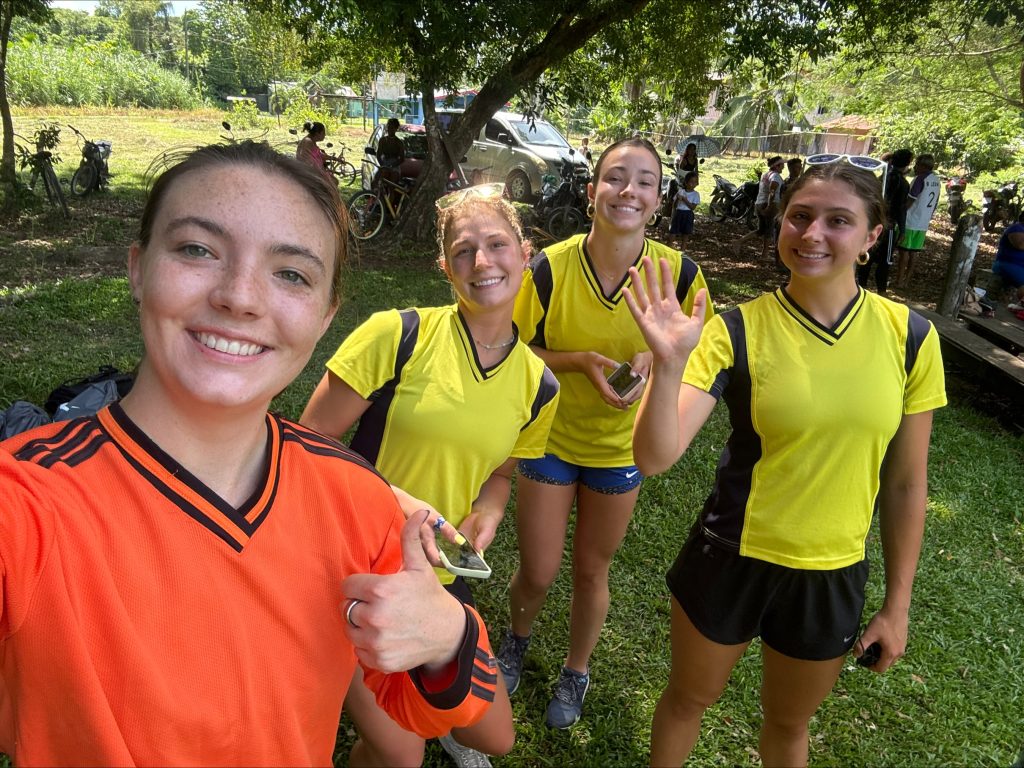
To the uninitiated, it appears to be a deceptively straightforward undertaking. Guiding a ball around a grassy pitch and kicking it into a net is, presumably, a relatively easy task. Soccer, however, is far from a simple sport. My first real exposure to this billion-dollar sports industry was on a pitch in Gandoca, Costa Rica. Through the generosity of Duke’s Rubenstein Student-Athlete Civic Engagement (ACE) program, I was one of the dozen Duke student-athletes selected for the opportunity to reside within this rural community and experience what the locals reverently refer to as “football.”
While all the Duke student-athletes on this ACE trip were familiar with the high-stakes thrill of competition, we were taken aback by both the intensity of the game, and by how much fun we were having in the moment.
After raking the grass from the freshly mowed pitch the previous day, followed up briefly with some strategy talk, “Team Tucán” was quickly assembled, named for Casa Tucán Tranquilo, the organic farm our ACE group lived and worked on for two weeks. While all the Duke student-athletes on this ACE trip were familiar with the high-stakes thrill of competition, we were taken aback by both the intensity of the game, and by how much fun we were having in the moment. The format of the tournament was loose and free-flowing, with players arriving directly from work and immediately jumping right into the game, some even switching positions on a whim. This made for a lively environment that was both laid-back and competitive, with attendees and players of all ages listening to local music booming from speakers while spectators were wildly cheering for their favorite players. The resounding roar from the pitch created an atmosphere of contagious enthusiasm that could not be contained.
Several members of Team Tucán, myself included, were less than fluent in the Spanish language, but while on the pitch, it didn’t matter. Suddenly, the language barrier vanished. The realization dawned: Soccer didn’t need to be spoken, it needed to be played.
I learned somewhat early on that I, the goalkeeper, could reliably know someone was directly addressing me when anyone yelled “keeper!” With a borrowed jersey as well as loaned gloves, I caught soccer balls (on one occasion with my face) that came too close to Team Toucán’s goal and threw them back into play, since I never quite mastered the art of kicking a soccer ball very far.
This experience, the thrill of the games, missing two penalty kicks in a row (nobody told me they would be kicking the ball at me so hard), brought me to an important realization: Everywhere you go, regardless of nationality, spoken language, race, sex, age, or any other criteria people are just people.
This experience, the thrill of the games, missing two penalty kicks in a row (nobody told me they would be kicking the ball at me so hard), brought me to an important realization: Everywhere you go, regardless of nationality, spoken language, race, sex, age, or any other criteria people are just people. Everyone on that pitch was full of love for the game, laughing and jeering at friends on the opposing team and joking and strategizing with teammates during breaks. Everyone was on one wavelength, speaking one language. When your team scores, it doesn’t especially matter what you say, because, in the language of soccer, it all translates to “GOAL!”
